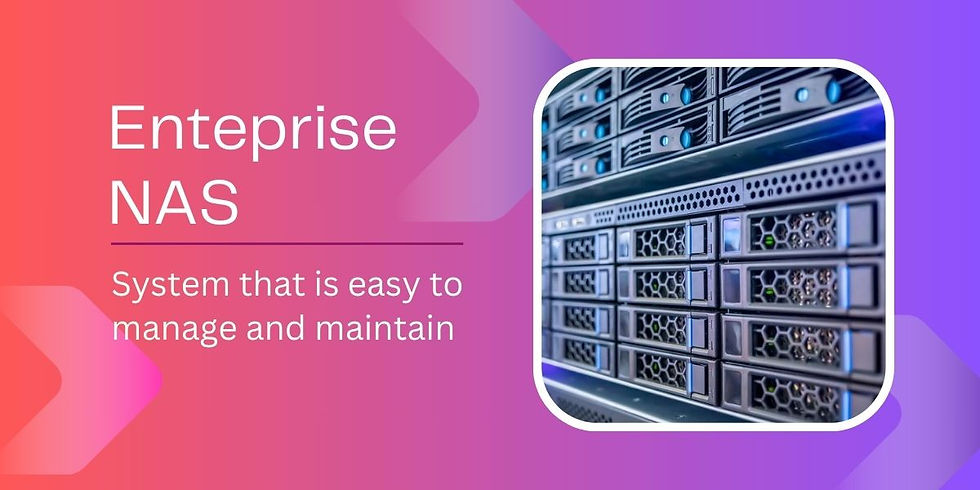Exploring the Different Types of Enterprise NAS Servers
- Scale out nas
- Oct 6, 2023
- 2 min read

Network attached storage has become an essential component for many enterprise businesses. Having a secure and reliable storage solution for an organization's digital assets helps maintain a streamlined workflow and can protect against data loss. With the ever-increasing need for data storage, network attached storage (NAS) has emerged as a popular solution for businesses of all sizes. Enterprise NAS servers have advanced storage features that aid in data protection and ensure faster data transfer rates. In this blog post, we will explore different types of enterprise NAS servers that cater to specific business needs.
Software-defined NAS
Software-defined NAS is a type of enterprise server that runs on software-defined storage (SDS). This system has distributed storage architecture, meaning it can scale up or down by adding or removing storage nodes without causing downtime. Aside from storage expansion, SDS-based NAS allows for the creation of storage pools, intelligent data tiering, and secure remote replication.
Rack-mounted servers
These NAS servers are designed to fit into server racks, which provides room for more storage and easy access. Rack-mounted servers typically offer faster data transfer rates and support virtualization, which enables an enterprise NAS business to operate multiple operating systems simultaneously, ideal for cross-platform applications.
Cloud-based NAS
Cloud-based NAS is a type of enterprise server that provides storage services via cloud storage. This service falls in the hybrid category as it combines the benefits of solid-state drives with cloud data storage. Cloud-based NAS is suitable for businesses looking for a cost-efficient solution that provides secure data mobility.
File servers
File servers are the backbone of NAS servers. They store and retrieve files over a network. File servers are designed exclusively for file sharing and collaboration, making it the most suitable option for content-heavy enterprises such as graphic design companies and media agencies.
Scale-out NAS
Scale-out NAS servers are a horizontal network of NAS servers which provide parallel processing of input and output operations. With scale-out servers, an enterprise business can expand storage capacity by adding more nodes. They are an ideal solution for big data analytics, high-performance computing, and running enterprise applications.
Conclusion
Enterprise NAS servers cater to specific needs and finding the right solution is essential for a business's efficient workflow. Depending on an enterprise's business needs, there are many options to choose from. This blog post has explored the different types of enterprise NAS servers, including software-defined NAS, rack-mounted servers, cloud-based NAS, file servers, and scale-out NAS. Each type offers its advantages, like scalability, optimized performance, and secure remote access. When choosing which NAS storage server to implement, enterprise businesses should consider their storage requirements, types of applications they use, how much data they need to store, and future growth plans. By choosing the right enterprise NAS server, businesses can enhance their digital asset management, and streamline their workflow for smooth operation.



Comments